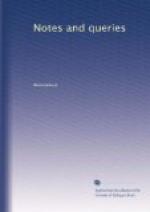In both these passages of Cowper, the umbrella appears to be equivalent to what would now be called a parasol.
L.
Pope and Bishop Burgess (Vol. ii., p. 310.).—The allusion is to the passage in Troilus and Cressida:
“The dreadful sagitary appals our numbers.”
which Theobald explained from Caxton, but Pope did not understand.
C.B.
[Not the only passage in Shakspeare
which Theobald explained and Pope
did not understand; but more
of this hereafter.]
Book of Homilies (Vol. ii., p. 89.).—Allow me to inform B. that the early edition of Homilies {347} referred to in his Query was compiled by Richard Taverner, and consists of a series of “postils” on the epistles and gospels throughout the year. It appears to have been first printed in 1540 (Ames, i. 407.), and was republished in 1841, under the editorial care of Dr. Cardwell.
C.H.
St. Catharine’s Hall, Cambridge.
Roman Catholic Theology (Vol. ii., p. 279.).—I beg to refer M.Y.A.H. to the Church History of England by Hugh Tootle, better known by his pseudonyme of Charles Dod (3 vols. folio, Brussels, 1737-42). A very valuable edition of this important work was commenced by the Rev. M.A. Tierney; but as the last volume (the fifth) was published so long ago as 1843, and no symptom of any other appears, I presume that this extremely curious book has, for some reason or other, been abandoned. Perhaps the well-known jealousy of the censor may have interfered.
A useful manual of Catholic bibliography exists in
the Thesaurus Librorum
Rei Catholicae, 8vo. Wuerzburg, 1850.
G.R.
Modum Promissionis (Vol. ii., p. 279.).—Without the context of the passage adduced by C.W.B., it is impossible to speak positively as to its precise signification. I think, however, the phrase is equivalent to “formula professionis monasticae.” Promissio frequently occurs in this sense, as may be seen by referring to Ducange (s.v.).
C.H.
Bacon Family (Vol. ii., p. 247.).—The name of Bacon has been considered to be of Norman origin, arising from some fief so called.—See Roman de Rose, vol. ii. p. 269.
X.P.M.
Execution of Charles I. and Earl of Stair (Vol. ii., pp. 72. 140. 158.).—MATFELONENSIS speaks too fast when he says that “no mention occurs of the Earl of Stair.” I distinctly recollect reading in an old life of the Earl of Stair an account of his having been sent for to visit a mysterious person of extreme old age, who stated that he was the earl’s ancestor (grandfather or great-grandfather, but whether paternal or not I do not remember), and that he had been the executioner of Charles I.
T.N.




